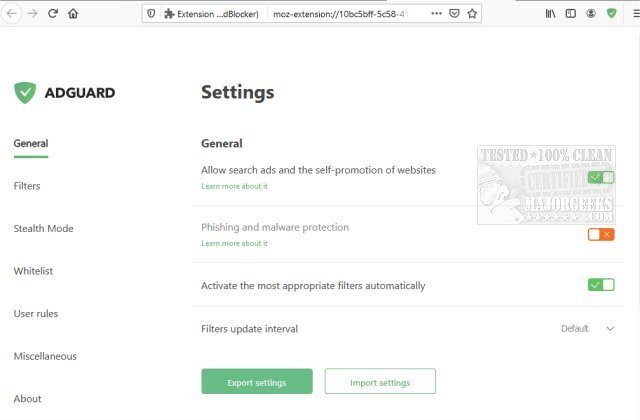

- Google extensions adguard adblocker how to#
- Google extensions adguard adblocker full#
- Google extensions adguard adblocker code#
- Google extensions adguard adblocker plus#
- Google extensions adguard adblocker download#
Others, like AdBlocker Ultimate, take a more aggressive approach.
Google extensions adguard adblocker plus#
Some ad blockers, such as AdBlock Plus include filters and the ability to let in non-obtrusive advertising.
Google extensions adguard adblocker full#
Do you just want to stop annoying pop-up ads from appearing or do you want the full range of services, including privacy features and an end to ad-tracking? Grab the ad blocker that ticks off all the boxes on your wishlist. You can narrow down your choice in ad blockers by deciding specifically what you're looking to accomplish with such an app or extension. You should also figure out if a browser extension will take care of your ad-blocking needs or whether you should consider switching browsers to one with more built-in privacy features. Determine if the free services provide enough ad-blocking to meet your needs or whether a paid app delivers more for your money. Many of the best ad blockers are available for free, either as extensions or as standalone apps, though a few, like AdLock, charge a fee.
Google extensions adguard adblocker how to#
The usual caveats apply: Browsing through Tor will slow down the web experience, and some features, like video streams and video files won’t work in order to preserve anonymity.ĭownload Onion Browser: iOS How to choose the best ad blocker for you
Google extensions adguard adblocker download#
Previously a premium app, Onion Browser has since moved to a donation model, opening up access to everyone who wants to download the app, without compromising security or features. But under V3, they are treated like accessories, given limited privileges and only allowed to execute reactively.IOS users aren’t left out when it comes to browsing the Tor anonymizer network, with the Onion Browser among the more popular options on Apple’s mobile OS. They wrote, "Under Manifest V2, extensions are treated like first-class applications with their own persistent execution environment.

The future of content blocking in web browsers looks a lot like the way it was described by Alexei Miagkov and Bennet Cyphers from the EFF last December. "The only thing you might notice is ad flickering due to the lag in the application of cosmetic rules." "Although the experimental extension is not as effective as its predecessor, most users won't feel the difference," said Seregin in a blog post just over a week ago. While MV3 forced extension makers to rely on declarative rules (set in advance) rather than dynamic ones (generated on the fly), Seregin nonetheless suggests AdGuard will manage. Brave, for example, will need to launch its own extension store because the Chrome Web Store won't be an option.ĭmitriy Seregin from AdGuard offered a slightly more optimistic take in his description of his firm's effort to create AdGuard AdBlocker MV3 Experimental. Outliers like Brave and Mozilla have said they plan to continue support for MV2, though some resources will be required to do so. Apple Safari introduced support for MV3 in version 15.4 and while Apple has not indicated whether it intends to drop support for MV2, it removed the blocking WebRequest API years ago. That's likely to be the case for Microsoft Edge, which has endorsed MV3. That advice won't be viable as of January, when Manifest v2-based extensions will stop working in Chrome. Translation: We made them too powerful, we'll cram this genie back in its bottle CONTEXT
Google extensions adguard adblocker code#
This approach avoids presenting the extension user with an installation warning that the installed code can "Read and change all your data on all websites" – which may sound scary but is generally what you want when using an add-on that cleans up all the webpages you visit.īut this "permission-less" approach means the extension cannot carry out operations supported by uBlock Origin, such as custom JavaScript injection or filtering of redirects, CSP (content security policy) directives, URL parameters, and cosmetic page elements. This function replaces the webRequest API from MV2, which allows a JavaScript event handler to modify network requests and has been the primary mechanism for intercepting unwanted network content.Īs Hill explains in his commit text, his extension uses declarativeNetRequest to conform with Google's stated goal for MV3 to not require the broad "read/modify data" permission.

UBO Minus relies on the declarativeNetRequest API in MV3 to block content. Makers of ad blockers and browser privacy extensions fear the end is near FULL STORY


 0 kommentar(er)
0 kommentar(er)
